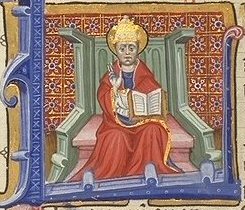 "A burden to shudder at"--thus St. Leo I spoke of the papal office. Yet few
have been so capable of bearing that burden as the clever, energetic, and
holy Tuscan who succeeded St. Sixtus III. A deacon in the Church at Rome
Leo was absent in Gaul on an important mission for the Emperor when St.
Sixtus III died. He returned to find himself pope.
"A burden to shudder at"--thus St. Leo I spoke of the papal office. Yet few
have been so capable of bearing that burden as the clever, energetic, and
holy Tuscan who succeeded St. Sixtus III. A deacon in the Church at Rome
Leo was absent in Gaul on an important mission for the Emperor when St.
Sixtus III died. He returned to find himself pope.
To rule the mid-fifth-century Church was not easy. The West was filled with
the clamor of barbarians wandering through provinces which had lost the
nerve to resist. The East was troubled with a new and dangerous heresy.
Leo faced both situations is the story of his pontificate.
Leo acted strongly against all heresies, but the dogmatic crisis of his
pontificate arose when the Constantinople monk Eutyches and the patriarch
of Alexandria, Dioscorus, began to teach that in Christ there is only one
nature. This Monophysite (one-nature) heresy made such progress in the
East that St. Flavian, the patriarch of Constantinople, called on the Pope
to do something about it. Leo did. In a famous letter to Flavian, the Pope
so clearly and forcefully exposed and condemned the Monophysite error
that this letter has been venerated as a creed.
The Monophysites, however, gained the ear of the Eastern Emperor,
Theodosius II, and succeeded in holding a packed synod at Ephesus. There
they so maltreated the saintly Flavian that he died, and they proclaimed
the Monophysite error to be true Christian doctrine. Leo came to the
rescue. In stinging words he characterized the Ephesus affair as a robbery,
and the name has lived. To this day it is known as the robber synod. To
counteract Monophysite influence on Theodosius, Leo got Valentinian III,
the Western Emperor, to wake up his cousin to the danger of fostering
heresy. Though Theodosius died, his successor Marcion heeded the Pope. To
settle the matter a great council, the fourth ecumenical, was called to
meet at Chalcedon in 451. There the fathers condemned Eutyches and accepted
Leo's letter as the symbol of orthodox belief. Though the Monophysite
heresy lingered long to trouble the Eastern Church, this great council
killed its chance to win the East.
In the West imperial feebleness forced Leo to stand as buffer between his
people and barbarian hordes. Attila the Hun, checked at Chalons, had burst
over the Alps in 452. Leo went north to meet Attila. On the banks of the
Mincio these two giants of the age met, one representing brute might, the
other, moral force. And Leo prevailed. Attila agreed to make peace and
spare Rome. Three years later when a Vandal fleet sailed up the Tiber, the
panic-stricken Romans turned to their bishop. The Pope went outside the
walls to meet Genseric, the Vandal king. Genseric agreed to spare the lives
and homes of the Romans. Then for fourteen days the Vandals helped
themselves to the wealth of imperial Rome, but true to Genseric's promise
to the Pope, they set no fires and kept their swords sheathed.
The many-sidedness of Leo is a marvel. Diplomat, statesman, administrator,
theologian, orator,
and above all a holy man, this pope well deserves the title, Leo the Great.
Excerpted from "Popes
Through the Ages" by Joseph Brusher, S.J.

